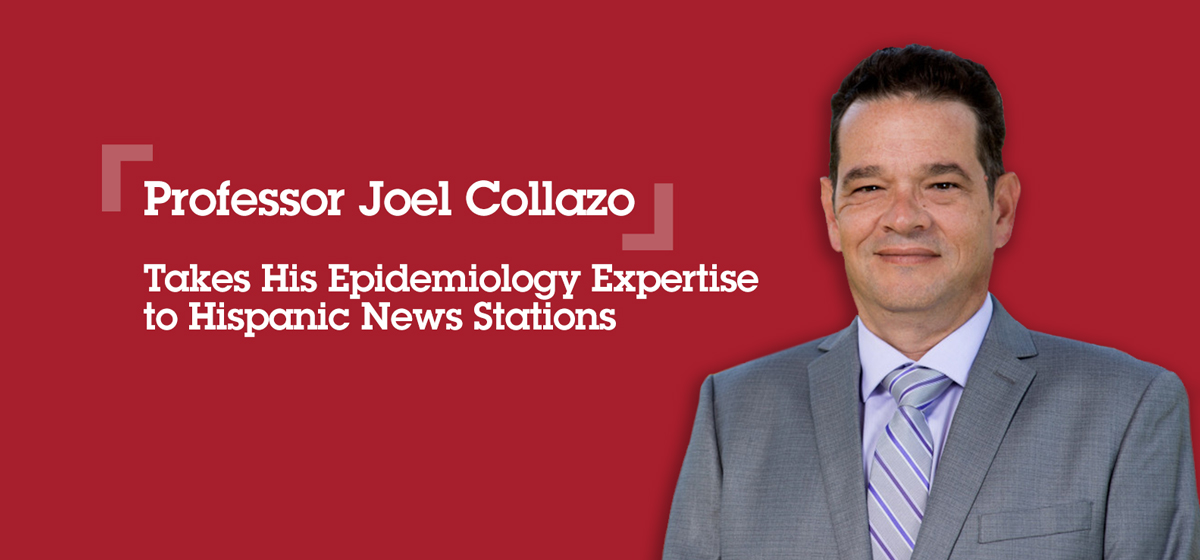Amid the confusion surrounding the global Covid-19 pandemic, Dr. Joel Collazo, professor of Histology and Epidemiology in Barry’s Biomedical Sciences program, has been working to bring trustworthy and actionable information to Hispanic communities in Miami and beyond.
The Cuban-born medical doctor has spent much of his career teaching and studying diseases and their effects on biological tissues; and he is currently pursuing his PhD in Public Health with a specialization in Epidemiology. This wealth of experience ushered him into the spotlight this spring, when the pandemic became widespread and fear mounted across the country. In mid-April, Collazo appeared on “Ahora con Oscar Haza,” [https://mega.tv/noticias/ahora-con-oscar-haza-04-16-20-ismael-cala-entrevista-al-dr-joel-collazo-medico-y-profesor-de-barry-university] a syndicated Hispanic news show broadcast by MegaTV and filmed in Miami. Collazo spoke to host Ismael Cala about the importance of the economic shutdown to decreasing the number of Covid-19 cases and shared vital information about protecting yourself and others from contracting and spreading the virus.
“This is the first time I have had the honor to appear on the media in the United States,” says Collazo, who was also featured on the “Ahora con Oscar Haza” radio show, broadcast by Z 92.3 FM, and “Hoy por Hoy,” a morning radio show hosted by Felix Guillermo and Raquel Regalado on Radio Caracol Miami. Collazo says that he feels a duty to streamline information for Spanish-speaking audiences, which account for roughly 70% of Miami’s population. Particularly in an era when misinformation spreads quickly via social media, says Collazo, educating the public is essential. “People must understand that prevention is critical while we do not have a cure or a vaccine,” he says. “Also, it is crucial to understand that most of the cases are asymptomatic and can spread the infection. That is why it is key to maintain social distancing, wear facial masks (especially when social distancing is not possible), and wash [your] hands with abundant water and soap. This last measure is extremely important since soap inactivates the virus. In cases where washing hands is not possible, use hand sanitizer with at least 60% alcohol.”
Sharing this critical health information is important across all communities, but it can be especially lifesaving among those at greater risk. “It is very well known that minorities have been particularly impacted by the pandemic,” says Collazo. Socioeconomic factors and pre-existing conditions contribute to infection and mortality rates within minority populations, and, as Collazo points out, many members of minority groups hold jobs that do no accommodate working from home, putting them at greater risk. Additionally, within Hispanic communities, English is not always spoken or understood, so providing accurate and clear information in Spanish is essential. “I consider that sharing this information with [Hispanic audiences] in our mother language is of upmost importance to minimize as much as possible their risks,” says Collazo.
Because of his career interest in health care, Collazo has a unique view of the pandemic. “It has definitely made me rethink my priorities regarding my PhD. Right now, I am preparing my dissertation and although my research is not related to infectious diseases, it focuses on health disparities. The pandemic is a vivid example of how different population groups can be impacted by a disease, its outcomes, and the type of medical service they receive.” He is also adjusting the courses he teaches within Barry’s BMS program, taking advantage of this real-life scenario to educate his Epidemiology and Medical Microbiology students. And, this semester, he is conducting an Advance Studies one-credit course on the topic “Outbreaks,” which allows students to study diseases like Covid-19 from clinical, epidemiological, and microbiological perspectives. “Although we are experiencing many negative things, this situation has allowed me to grow professionally,” he says. “This pandemic has been a true school for me in many aspects.”

